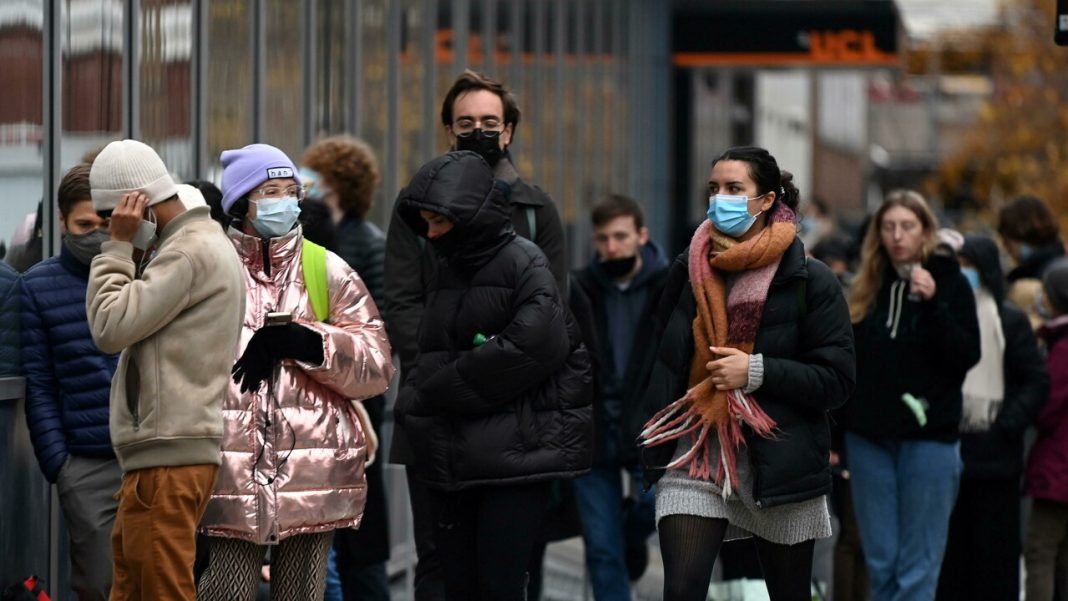And according to what Prime Minister Mario Draghi reported the day before yesterday, the cases of Omicron in Italy are “less than 0.2 percent”, while in other European countries, the variant is already prevalent. Thus, our country will have an advantage of about twenty days over the rest of Europe. But is the data we rely on reliable? In fact, “we do not know the true proportion of the presence of the Omicron variant in Italy” admits Massimo Seccusi, a professor at the Bio-Medico Campus in Rome. The problem is always the same: we don’t sequence enough. And so we sail in the dark.
Meanwhile, the new strain is growing throughout the rest of Europe at levels never seen before. The health advisor for the Madrid region, Enrique Ruiz Escudero, told Iberian media that the prevalence of the new variant could already reach 60% in some regions. In Portugal, one of the world’s most vaccinated countries, it is estimated that 20% of cases are due to the new strain, but the percentage – the health minister said – could rise to 50% in the week of Christmas. 80% by the end of the year.
The dominant form in Scotland: “The Tsunami Has Arrived”
According to Nicola Sturgeon, Scotland’s Prime Minister, 51.4% of cases detected in Scotland are attributable to Omicron. Just a week ago it was 15.5%. “The tsunami I warned about a week ago is starting to hit us,” Sturgeon said, adding that the new wave is putting pressure on the economy and other essential services as more and more people are infected and forced to self-isolate.
The numbers speak for themselves: in the UK today, there have been 93,045 infections, an absolute record for the third day in a row. In London, Omicron is now believed to be dominant. Across the island in the past two weeks alone, nearly 800,000 people have been infected. Trouble across all sectors As evidenced by the state of the Premier League: nine Premier League matches have already been postponed because many players have tested positive for Covid. And now there is talk of stopping the tournament.
New restrictions in Denmark
In Denmark, where there are nearly 5.8 million residents, more than 11,000 cases have been verified. Taking the appropriate proportions, it is as if in Italy there are more than 110 thousand diagnoses per day. Prime Minister Mette Frederiksen today announced new restrictions, including a complete closure of cinemas, theaters and concert halls, capacity limits for shops and restaurants and a “curfew” for nightclubs that will have to close at 11pm (alcohol will not be sold after 10pm). ).
What we know about Omicron
That Omicron being a (much more) contagious variant than the previous species is now beyond doubt. According to ISPI data, the Alpha strain took 13 weeks to become dominant in the UK, only Delta 6, and Omicron can do so in three weeks. The doubling time is estimated at two to three days. Added to this is the fact that Omicron is partially immune evading: in addition to evading (partially) the immunity conferred by previous infections, it makes vaccines less effective.
From a study conducted in South Africa, the protection of two doses of Pfizer against infection was found to be 80-33%, data in line with those reported by the UK Health Security Agency (UKHSA) days ago.

Instead, the efficacy against severe disease is estimated at 70% (previously it was 93). The first laboratory studies suggest that a booster dose may be necessary to restore protection against this variant, but at least in Italy, only 23% of the population received an additional dose.
Is the new alternative less virulent?
The study in South Africa found that with the new variant, the risk of hospitalization was 29% lower compared to hospitalization rates in the first wave. This decline, however, must be contextualized in light of the large number of people already infected (about 70%) in the country before the emergence of the new strain.
From this point of view, the latest report from Imperial College London, which examined data from the UK’s Health Security Agency and the National Health Service (NHS), leaves little hope. The research found “no evidence that Omicron” causes infections “less serious than Delta,” considering the proportion of people who tested positive or the proportion of cases requiring hospital care after infection. “However – the authors specify – data on hospital admissions remain very limited at this time.”
What does the Imperial College report say?
The report also notes that the new alternative “largely escapes acquired immunity with the disease, with two doses of the vaccine” against Covid. Experts estimate that “the risk of reinfection with the Omicron variant is 5.4 times greater than that of the delta variant” and thus “the protection against re-infection by Omicron, given by past infections, can be up to 19%.” Scientists have also estimated the effectiveness of Covid vaccines against symptomatic Omicron infection. Well, “Efficacy is between 0% and 20% after two doses and between 55% and 80% after a booster dose.”
At the end of the month (or early January) more reliable data about the new variant
Britain’s HSA expects to have reliable data on disease severity and vaccine efficacy in the last week of December or more likely first of January. Experts warn that even if Omicron is milder, the exceptional rise in infections could risk disrupting health systems anyway.

“Reader. Travel maven. Student. Passionate tv junkie. Internet ninja. Twitter advocate. Web nerd. Bacon buff.”



